Filter by

Atlas Of Butterflies And Diurnal Moths In The Monsoon Tropics Of Northern Aus…
"Northern Australia is one of few tropical places left on Earth in which biodiversity—and the ecological processes underpinning that biodiversity—is still relatively intact. However, scientific knowledge of that biodiversity is still in its infancy and the region remains a frontier for biological discovery. The butterfly and diurnal moth assemblages of the area, and their intimate associati…
- Edition
- -
- ISBN/ISSN
- 9781760462321
- Collation
- -
- Series Title
- -
- Call Number
- -
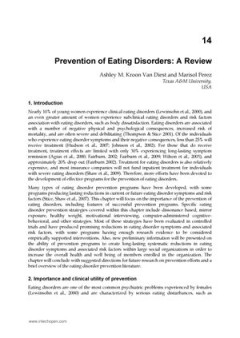
Prevention of Eating Disorders a Review
Prevention of Eating Disorders: A Review
- Edition
- -
- ISBN/ISSN
- 9789535100010
- Collation
- -
- Series Title
- -
- Call Number
- -
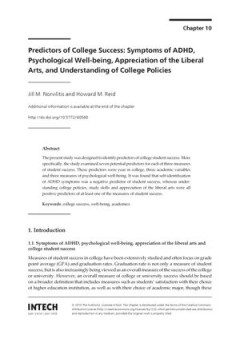
Predictors of College Success Symptoms of Adhd, Psychological Well-Being, Ap…
The present study was designed to identify predictors of college student success. More specifically, the study examined seven potential predictors for each of three measures of student success. These predictors were year in college, three academic variables and three measures of psychological well-being. It was found that self-identification of ADHD symptoms was a negative predictor of student …
- Edition
- -
- ISBN/ISSN
- 9789535121664
- Collation
- -
- Series Title
- -
- Call Number
- -
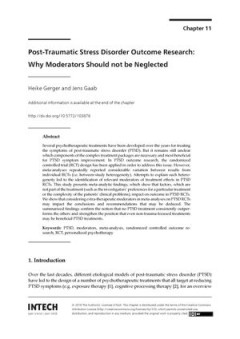
Post-Traumatic Stress Disorder Outcome Research Why Moderators Should Not Be…
Several psychotherapeutic treatments have been developed over the years for treating the symptoms of post-traumatic stress disorder (PTSD). But it remains still unclear which components of the complex treatment packages are necessary and most beneficial for PTSD symptom improvement. In PTSD outcome research, the randomized controlled trial (RCT) design has been applied in order to address this …
- Edition
- -
- ISBN/ISSN
- 9789535127284
- Collation
- -
- Series Title
- -
- Call Number
- -
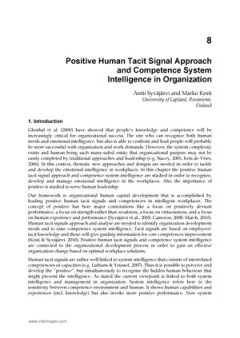
Positive Human Tacit Signal Approach and Competence System Intelligence in Or…
Positive Human Tacit Signal Approach and Competence System Intelligence in Organization
- Edition
- -
- ISBN/ISSN
- 9789533078380
- Collation
- -
- Series Title
- -
- Call Number
- -
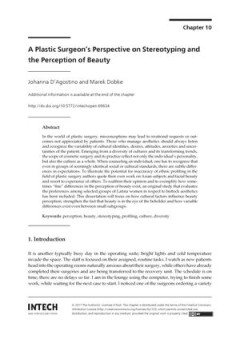
A Plastic Surgeon’s Perspective on Stereotyping and the Perception of Beauty
In the world of plastic surgery, misconceptions may lead to irrational requests or outcomes not appreciated by patients. Those who manage aesthetics should always listen and recognize the variability of cultural identities, desires, attitudes, anxieties and uncertainties of the patient. Emerging from a diversity of cultures and its transforming trends, the scope of cosmetic surgery and its prac…
- Edition
- -
- ISBN/ISSN
- 9789535135814
- Collation
- -
- Series Title
- -
- Call Number
- -
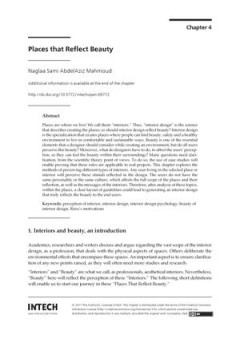
Places that Reflect Beauty
Places are where we live! We call them “interiors.” Thus, “interior design” is the science that describes creating the places; so should interior design reflect beauty? Interior design is the specialization that creates places where people can find beauty, safety and a healthy environment to live in comfortable and sustainable ways. Beauty is one of the essential elements that a designe…
- Edition
- -
- ISBN/ISSN
- 9789535135814
- Collation
- -
- Series Title
- -
- Call Number
- -
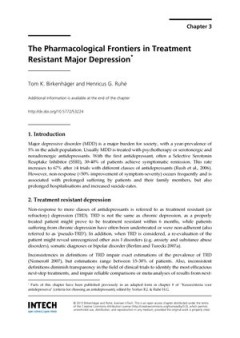
The Pharmacological Frontiers in Treatment Resistant Major Depression
The Pharmacological Frontiers in Treatment Resistant Major Depression
- Edition
- -
- ISBN/ISSN
- 9789535111474
- Collation
- -
- Series Title
- -
- Call Number
- -
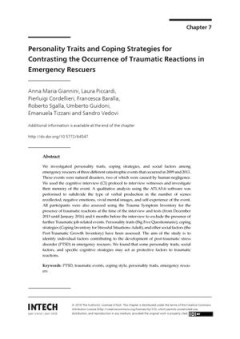
Personality Traits and Coping Strategies for Contrasting the Occurrence of Tr…
We investigated personality traits, coping strategies, and social factors among emergency rescuers of three different catastrophic events that occurred in 2009 and 2013. These events were natural disasters, two of which were caused by human negligence. We used the cognitive interview (CI) protocol to interview witnesses and investigate their memory of the event. A qualitative analysis using the…
- Edition
- -
- ISBN/ISSN
- 9789535127284
- Collation
- -
- Series Title
- -
- Call Number
- -
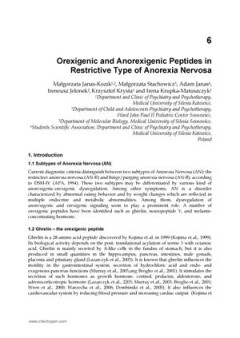
Orexigenic and Anorexigenic Peptides in Restrictive Type of Anorexia Nervosa
Orexigenic and Anorexigenic Peptides in Restrictive Type of Anorexia Nervosa
- Edition
- -
- ISBN/ISSN
- 9789535100010
- Collation
- -
- Series Title
- -
- Call Number
- -
 Computer Science, Information & General Works
Computer Science, Information & General Works  Philosophy & Psychology
Philosophy & Psychology  Religion
Religion  Social Sciences
Social Sciences  Language
Language  Pure Science
Pure Science  Applied Sciences
Applied Sciences  Art & Recreation
Art & Recreation  Literature
Literature  History & Geography
History & Geography